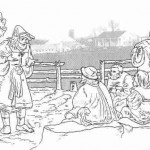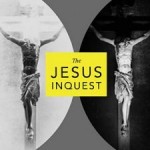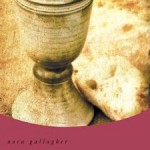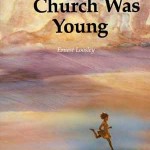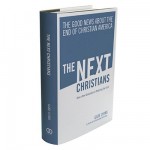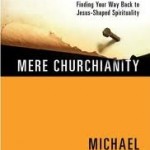The Secret of the Strength
Last week (and apparently last year), Rod suggested that I read The Secret of the Strength (alternate url that stopped working) by Peter Hoover. After reading it, I wish that I had done so last year when he first suggested it.
The Secret of the Strength tells the story of the Anabaptists. The author is a descendant of the Anabaptists, and some of his stories revolve around his own family. Most chapters begin with the story of an Anabaptist, which is then followed by Anabaptist quotations intermixed with Hoover’s commentary.
Trust me, you will not agree with everything that you read. In fact, the Anabaptists did not agree with one another on many aspects of theology. However, they did agree on several basic teachings, primarily that Jesus was with them, and that their “strength” came from him alone.
By the way, if you number the “Reformers” among your heroes, this book may force you to question their status, especially when you read the reasons that many Anabaptists were killed.
The last few chapters are the most discouraging to me. The author begins the book by telling how the Anabaptists exploded, taking their faith with them and proclaiming the gospel wherever they went. At the end of the book, the author tells how the Anabaptists imploded, separating from one another over issues completely unrelated to the gospel.
If you decide to read this book – or if you’ve read it in the past – please add your comments here.
2010 Book of the Year
Since I started blogging in 2006, I’ve chosen my favorite book of the year. I suppose that I could use any criteria that I want, but I’ve decided to only choose a book that I read for the first time during the previous year.
This year, my favorite book was Your Church is Too Small by John H. Armstrong.
I reviewed the book here. And, I published several quotes from the book: quote 1 by John Calvin, quote 2 by Martin Luther, quote 3 by Cyprian, quote 4 by Francis A. Schaeffer, quote 5 by Hans Urs von Balthasar, quote 6 by Rex Koivisto, and quote 7 by Richard Halverson.
If you have not read this book yet, I would highly recommend it!
By the way, if you’re still reading this post and if you’re interested, my second choice would be Michael Spencer’s Mere Churchianity, which I reviewed here.
Also, here are links to my favorite books of previous years: 2006, 2007, 2008, and 2009.
Requested for Review: The Jesus Inquest
Since I read and reviewed Nora Gallagher’s The Sacred Meal, it is time to request another book from BookSneeze.
I decided to request Charles Foster’s book The Jesus Inquest: The Case for and Against the Resurrection of the Christ. I’ve never read anything by Foster, and I don’t know much about this book.
Here is a blurb about the book:
An unbiased examination and compelling courtroom presentation revealing the undeniable facts of the death and resurrection of Jesus Christ.
Intelligent, fair, and remarkably compelling, The Jesus Inquest argues the case both for and against the resurrection of Christ. Point-by-point, Foster, in turn as both barrister X and Y, leaves no theological stone or dissenter’s rock unturned as he digs for answers and the truth. In the end he is more convinced that Jesus is real, that He did rise again, and that He lives to offer forgiveness and hope to all who come to Him.
Now, I’ve read a couple of apologetic type books that seek to prove (and/or disprove) the resurrection of Jesus Christ. To be honest, I’m not convinced that this is a profitable venture. Jesus praised Peter because God the Father had revealed the truth to him, not because he figured it out from the evidence. But, I’m willing to read this book, hoping that there will be some benefit to the church in it.
(By the way, I also don’t believe that “an unbiased examination” is possible.)
I’ll let you know what I find.
Adding Significance to a Symbol
In The Sacred Meal, Nora Gallagher seeks to explain the significance of Communion – the Eucharist – the Lord’s Supper – the Agape Feast. She writes as one who has served the bread and the wine at many communion services primarily in the Episcopal denomination.
I must begin this review with a couple of confessions. First, I grew up in a different Christian tradition with a different understanding of the Supper. Second, I have since come to understand Communion as a completely different “practice” than either of these two traditions (the author’s or my own).
This book is part of a series called “The Ancient Practices Series.” Gallagher explains her understanding of the difference between a “practice” and a “habit”:
To engage in a practice is to show up and not get attached to the outcome. Unlike a habit, like driving down the same street from work to home every day, the purpose of a spiritual practice is to help us stay awake. Hidden in this kind of repetition is the chance that on any given day, the mind or soul will connect with what is waiting to connect to us. (pg xix)
The practice to which she refers is, of course, Communion. In her practice, Communion consists of standing in line with strangers (per the author’s description) to accept a wafer of bread and a sip of wine (or perhaps to dip the bread in the wine).
The book, then, is her attempt to add significance to this practice. She does so by retelling several episodes in her own life around the event of communion. The stories are told in a vivid and easy-to-read fashion which causes the reader to empathize with the author and the other characters in the story.
Gallagher divides her book into eleven chapters and a study guide. She invites her readers to consider the “waiting,” the “receiving,” and the “afterward” of a communion service. She also wants her readers to connect to God through various experiences, including experiences of communion.
The author does manage to attach significance to the symbol of a meal. She attaches significance from the life of Jesus, and from her own life. She presents the symbol of a table that is open to anyone, from alcoholics and drug addicts to the religious elite.
The problem with this book is actually not the author’s problem. The problem lies in the traditional understanding of “Communion.” The author does not tie the significance of “Communion” back to scriptural passages about “Communion.” Why? Because the taking of a wafer and a sip of wine cannot be connected to the meal that we find in the pages of the New Testament.
Thus, today, we must find significance in the symbol of a table, instead of gathering around a real table. We partake of a symbol of a meal, instead of sharing in the Lord’s Supper. We share the elements of the Eucharist, instead of thanking God for the food that we share with one another. We stand in line with strangers for “Communion service,” instead of actually sharing fellowship with our brothers and sisters. We call a wafer and a sip a feast, instead of truly sharing a love feast (Agape feast).
I’m not blaming Gallagher. This search for significance in the “Supper” or “Communion” or “Eucharist” has been going on for many, many years. And, it will continue until we put away the symbols and start sharing in the supper itself… a supper that is a real meal with real people with whom we share real relationships with Jesus as the real host.
(I received this book for free from BookSneeze.com in exchange for this review.)
Book Suggestions?
So, I was given a couple of amazon.com gift cards for Christmas. I’m quickly making a wish list and trying to decide what books to purchase with these gift cards.
I’ll probably buy books on ecclesiology. I’d like to buy a few academic books and a few more popular books. But, I’m having a hard time deciding what to buy.
Do you have any suggestions?
When the Church was Young
Last year, I wrote two posts on the book When the Church was Young by Ernest Loosely. I have combined those two posts into one here.
——————————————————————
What the young church did not have
Ernest Loosely divides his book When the Church was Young into two parts. In the first part, Loosely describes several things that the early church did not have. He says these same things often distract the modern church. The author says the young church had no buildings, no denominations, no fixed organization, no New Testament, no vocabulary of its own, no dogmatic system, and no Sabbath rest.
Before anyone jumps on Loosely for this list, we must admit that he is correct in each instance. Notice that Loosely doe not claim that it is wrong for the church to possess any of these things, but that in each case, a focus on one of these things could cause the church to lose site of something that is more valuable.
For example, concerning organization, Loosely said that the early church had “no fixed organization.” Does he mean that the early church had no organization? Not at all. Consider this:
The early Christian documents show a development which was not absolutely uniform nor identical in every place. Development was marked by local differences and modifications. This again is exactly what we might expect, if we believe that life fashions form and not that form produces life. They disposed of the idea that one form is essential or unalterable. (p. 27)
Notice what Loosely said, because it is important for his entire argument, “We believe that life fashions form and not that form produces life.” Yes, there was organization in the early church, but it was organization that flowed from the pre-existing life among the church. Organization did not come first; life came first.
I know that many of my readers are probably wondering about Loosely’s statement that the early church had “no New Testament.” How can it be distracting for us to have a New Testament today?
Loosely begins by noting, “The first impulse of the disciples was not an impulse to write, but to preach.” (p. 31) Thus, in the early days of the church, the followers of Jesus were intent on proclaiming Jesus of Nazareth as the Messiah who had been crucified and had risen from the dead. This was their Gospel – their “word” or “message” or “story”.
The writings of the New Testament came about as a way of proclaiming that message and of dealing with problems related to living out that message. As Loosely explains:
The literature arose out of the situation. As the church developed, men wrote to speak to needs, needs dealing specifically with the church! Neither the gospels nor the epistles can be really understood apart from the actual circumstances of the church’s development. Simply to sit in the study and compare and analyze and dissect the documents is a very imperfect method of reaching an understanding of the New Testament or the church when it was young. The church, and her literature, are the product of a great surging spiritual movement. She must be understood in relation to that movement. (p. 32)
So, the early church did not set about to produce a literature (New Testament) that would be used to propagate the movement. Instead, as Loosely explains, the movement was propagated by the Spirit, and the literature arose secondarily in order to deal with issues that arose afterwards.
Does this mean, then, that Loosely places little importance on the New Testament? Absolutely not. In face, he states that we now have a literature that was produced “in the good providence of God… in a way that was wholly of God.” Yes, it is good that the modern church has the New Testament, but the young church did not. The young church was part of a movement of the Holy Spirit, out of which the New Testament developed.
Each chapter of this book if provocative and filled with statements that should make us all think. For example, concerning dogmatic systems, Loosely says, “To define is only too often to divide.” (p. 49)
In my next post concerning this short book, I’m going to cover that last section, in which Loosely describes what the young church did have.
——————————————————————
What the young church DID have
Ernest Loosely divides his book When the Church was Young into two parts. In the first part, Loosely describes several things that the early church did not have, while in the second part (reviewed in this post) he describes three things that the early church DID have: an experience, a store of teaching from Christ, and a Gospel.
To begin with, Loosely said that the early church had an experience of living with Jesus Christ. This began with the early apostles and disciples who spent three years with Jesus:
With Him through months of success and popularity, with Him through seasons of gloom and apparent failure; with Him in city and village, in the country and by the seashore, on mountain and lake; with Him while He was teaching and working miracles, while He was meeting the arguments of hostile Pharisees, and while He was taking little children in His arms; with Him in the crowds, and afterwards in the silence and the solitude; and all the time the wealth of His soul was being outpoured into their lives. (p. 63-64)
The church continued to experience the presence of Jesus after his ascension through his indwelling presence. This presence gave them “a sense of power, of adequacy, of readiness to cope with any situation that arose.” (p. 66) They presence of Christ also gave them a sense of joy and a desire to share what had happened to them with one another and with others.
In fact, the experience of the abiding presence with Jesus was a replacement (and a better replacement) for the experience of the physical presence of Jesus. In fact, later disciples (Paul, for example) would write about knowing Christ in a way that went beyond the physical. As Loosely explains:
Paul had arrived at a sense of communion with Christ of the deepest and most intimate kind. It is a fellowship far closer than that of mere physical nearness. Far closer! (p. 66)
But, what does Loosely mean by “an experience”? He explains further when he begins to describe the young church’s possession of “a store of teaching from Christ”:
When the church was very young, it also had a store of teaching received from Christ. An “experience” might possibly be thought of as an emotional state, a transient sentiment. Had that been all the church had when it was young, it would quickly have subsided, the members in the movement left flat and spiritless. But Jesus had given to the disciples something so profound, we are thinking about it still, with a growing conviction that there is food for thought not only for their age and ours, but for all those yet to come. (p. 71)
Yes, their experience was more than emotion or sentiment. It was an encounter with the living and risen Christ, and it continued through his indwelling presence.
Simultaneously, they continued to learn from Jesus through one another. They contemplated and meditated on the teachings of Jesus. In the same way, Loosely says that the church today must preserve for ourselves and proclaim to mankind the words of Jesus.
How do we proclaim them? As gospel – “good news”! This is the third possession of the young church according to Loosely. The earliest disciples were amazed at the good news that was proclaimed to them by Jesus and that currently reshaped their lives. Everything was different!
They found that the news was so good that joy flooded all circumstances and situation, such that the good news became better than oppression or suffering.
Eventually, they found that this “good news” also affected people who lived in other cultures with different backgrounds. The gospel became even better news as it reached across cultural, economic, religious, ethnic, and all other barriers to change the lives of people.
Loosely closes this short book with this:
When the church was very young, it had a gospel; and now that the church is no longer young, but tempted to think of itself as entitled to the reliefs and relaxations of advancing years, the church has nothing better than the gospel to give to the world. (p. 78)
I don’t know about you, but this is a reminder that I needed moving into the new year.
The Next Book: The Next Christians
Now that I’ve completed and published my second review for Waterbrook Multnomah’s Blogging for Books program (see my review of Michael Spencer’s Mere Churchianity), it’s time to order another book.
This time, I’ve chosen Gabe Lyon’s book The Next Christians. I bought Lyon’s (along with David Kinnamon) previous book unChristian last year with a gift card that I received for Christmas.
So, what is The Next Christians about? I don’t know, because I haven’t read it yet, but this is part of the publisher’s blurb (and we all know how accurate those can be):
While many Christians are bemoaning their faith’s decline, Gabe Lyons is optimistic that Christianity’s best days are yet to come. In the wake of the stunning research from his bestselling book, unChristian, which revealed the growing disenchantment among young generations for Christians, Lyons has witnessed the beginnings of a new iteration of the faith. Marked by Lyons’ brutal honesty and unvarying generosity, Lyons exposes a whole movement of Christians—Evangelicals, Mainline, Protestants, Orthodox, Pentecostals, and others—who desire to be a force for restoration even as they proclaim the Christian Gospel. They want the label Christian to mean something good, intelligent, authentic, and beautiful.
So, it sounds interesting.
By the way, the last time I requested a book from the Blogging for Books program, the book shipped the same day, and I received it just a few days later. (The Next Christians hasn’t shipped yet, but there are still a few hours left in the day.)
A spirituality that acts like Jesus of Nazareth
The church (in any and all of its various organizational forms) is in the business of making disciples of Jesus Christ, right? Well, no. At least, not if you accept the findings of Michael Spencer in his book Mere Churchianity. And, I tend to agree with him.
Michael Spencer (better known to many internet fans and followers as the Internet Monk) died in April 2010, but not before finishing writing and editing his only book Mere Churchianity: Finding Your Way Back to Jesus-Shaped Spirituality.
As the title suggests, Spencer finds a disconnect (a Jesus disconnect) between church practices and emphases today and the life of Jesus as demonstrated in the pages of the Gospels, Epistles, and the Revelation in the New Testament. He writes primarily to those who have already left or are thinking about leaving church organizations.
So, Spencer calls his reader back to a spirituality that resembles the person of Jesus Christ as we see him in the New Testament – especially in the Gospels, but also as he is modeled for us in the Epistles and the Revelation. He writes:
I’m looking for a spiritual experience that looks like, feels like, sounds like, lives like, loves like, and acts like Jesus of Nazareth. It’s that simple. (p. 65)
[M]y primary purpose is to get you to think more intentionally about Jesus. Not an organization or a set of doctrines or even Christianity. But Jesus. (p. 69)
The book is composed of four sections: The Jesus Disconnect, The Jesus Briefing, The Jesus Life, and The Jesus Community. Each section is made up of four or five short chapters. The chapters are easy to read, and filled with thought-provoking images.
I did not agree with everything that Spencer wrote. For example, he had to make generalizations about modern church organizations – generalizations that are not true in every detail to every church organization. Also, I wish he had made a distinction between “church” (in the scriptural sense of the word) and the modern organizations that call themselves “church.”
I thoroughly enjoyed this book and would recommend it to anyone. Even though Spencer says he wrote the book for those who have left the church, I think people who remain staunchly in their church organizations should read it as well.
(I received this book for free from WaterBrook Multnomah Publishing Group for this review as part of their Blogging for Books program.)
(Please consider rating my review below or at the WaterBrook Multnomah site here.)
Book Sneeze – The Sacred Meal
Thanks to Jeremy at “Till He Comes” for telling me about another book review program. This program is called “Book Sneeze.”
When you sign up for Book Sneeze, they send you a free book (of your choice) to review. Once you write a review, publish it on your own site, publish it on a consumer site (such as Amazon.com or Barnesandnoble.com), and post a link to your review at Book Sneeze, you can request a another free book to review.
For my first book to review on Book Sneeze, I’ve requested The Sacred Meal by Nora Gallagher. I don’t know what to expect from this book (or the series), but I’m very interested in the common meal shared by the church in the NT (you know, the one that became a symbol of a meal currently called “The Lord’s Supper” or “Communion” or “the Eucharist).
Here is part of the publisher’s description of the book:
In her inimitable style of memoir and personal reflection, Nora Gallagher explores the beauty and mystery of this most fascinating of topics. Whether exploring the history of Christian communion, taking us inside the workings of a soup kitchen, or sharing times of joy and sadness with friends, she reminds us what it means to partake of, and be part of, the body of Christ.
So, I’m looking forward to reading and reviewing this book.
Let me know if you decide to join Book Sneeze also.
Following Jesus?
Are you following Jesus? Are you his disciple? Are you abiding in him as he abides in you? Have you been crucified with Christ? Is it no longer you who lives but Christ who lives in you?
I’ve been asking myself these (and other) difficult questions. Why the questions and thoughts? Well, they’ve been spurred on by the writing of Michael Spencer.
For example, I read the following in Mere Churchianity by Michael Spencer:
“I’m looking for a spiritual experience that looks like, feels like, sounds like, lives like, loves like, and acts like Jesus of Nazareth.”
Before you get “hung up” on Spencer’s term “spiritual experience,” please pay attention to what he’s saying.
If my life does not look more and more like Jesus’ life, then I am not abiding in him. If I am not doing more and more things like Jesus did (as attested in the Gospels), then I am not following him (i.e., being his disciple). If I am not spending time with the kind of people that Jesus spent time with, then he is not living his life in me.
The necessity of the comparison seems obvious. We’re giving a glimpse into the life of Christ not once, not twice, but from four different perspective.
We have a way to compare our life to the life of Christ. But, I don’t like the comparison.

